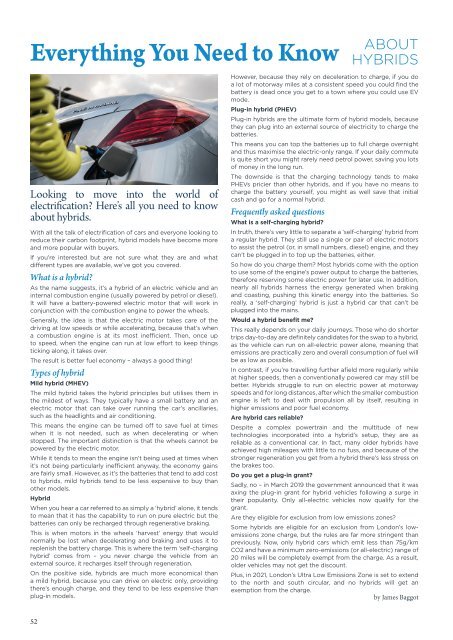I and A Mag Jan20
Telford Magazine
Telford Magazine
Create successful ePaper yourself
Turn your PDF publications into a flip-book with our unique Google optimized e-Paper software.
Everything You Need to Know<br />
Looking to move into the world of<br />
electrification? Here’s all you need to know<br />
about hybrids.<br />
With all the talk of electrification of cars <strong>and</strong> everyone looking to<br />
reduce their carbon footprint, hybrid models have become more<br />
<strong>and</strong> more popular with buyers.<br />
If you’re interested but are not sure what they are <strong>and</strong> what<br />
different types are available, we’ve got you covered.<br />
What is a hybrid?<br />
As the name suggests, it’s a hybrid of an electric vehicle <strong>and</strong> an<br />
internal combustion engine (usually powered by petrol or diesel).<br />
It will have a battery-powered electric motor that will work in<br />
conjunction with the combustion engine to power the wheels.<br />
Generally, the idea is that the electric motor takes care of the<br />
driving at low speeds or while accelerating, because that’s when<br />
a combustion engine is at its most inefficient. Then, once up<br />
to speed, when the engine can run at low effort to keep things<br />
ticking along, it takes over.<br />
The result is better fuel economy – always a good thing!<br />
Types of hybrid<br />
Mild hybrid (MHEV)<br />
The mild hybrid takes the hybrid principles but utilises them in<br />
the mildest of ways. They typically have a small battery <strong>and</strong> an<br />
electric motor that can take over running the car’s ancillaries,<br />
such as the headlights <strong>and</strong> air conditioning.<br />
This means the engine can be turned off to save fuel at times<br />
when it is not needed, such as when decelerating or when<br />
stopped. The important distinction is that the wheels cannot be<br />
powered by the electric motor.<br />
While it tends to mean the engine isn’t being used at times when<br />
it’s not being particularly inefficient anyway, the economy gains<br />
are fairly small. However, as it’s the batteries that tend to add cost<br />
to hybrids, mild hybrids tend to be less expensive to buy than<br />
other models.<br />
Hybrid<br />
When you hear a car referred to as simply a ‘hybrid’ alone, it tends<br />
to mean that it has the capability to run on pure electric but the<br />
batteries can only be recharged through regenerative braking.<br />
This is when motors in the wheels ‘harvest’ energy that would<br />
normally be lost when decelerating <strong>and</strong> braking <strong>and</strong> uses it to<br />
replenish the battery charge. This is where the term ‘self-charging<br />
hybrid’ comes from – you never charge the vehicle from an<br />
external source, it recharges itself through regeneration.<br />
On the positive side, hybrids are much more economical than<br />
a mild hybrid, because you can drive on electric only, providing<br />
there’s enough charge, <strong>and</strong> they tend to be less expensive than<br />
plug-in models.<br />
However, because they rely on deceleration to charge, if you do<br />
a lot of motorway miles at a consistent speed you could find the<br />
battery is dead once you get to a town where you could use EV<br />
mode.<br />
Plug-in hybrid (PHEV)<br />
Plug-in hybrids are the ultimate form of hybrid models, because<br />
they can plug into an external source of electricity to charge the<br />
batteries.<br />
This means you can top the batteries up to full charge overnight<br />
<strong>and</strong> thus maximise the electric-only range. If your daily commute<br />
is quite short you might rarely need petrol power, saving you lots<br />
of money in the long run.<br />
The downside is that the charging technology tends to make<br />
PHEVs pricier than other hybrids, <strong>and</strong> if you have no means to<br />
charge the battery yourself, you might as well save that initial<br />
cash <strong>and</strong> go for a normal hybrid.<br />
Frequently asked questions<br />
What is a self-charging hybrid?<br />
In truth, there’s very little to separate a ‘self-charging’ hybrid from<br />
a regular hybrid. They still use a single or pair of electric motors<br />
to assist the petrol (or, in small numbers, diesel) engine, <strong>and</strong> they<br />
can’t be plugged in to top up the batteries, either.<br />
So how do you charge them? Most hybrids come with the option<br />
to use some of the engine’s power output to charge the batteries,<br />
therefore reserving some electric power for later use. In addition,<br />
nearly all hybrids harness the energy generated when braking<br />
<strong>and</strong> coasting, pushing this kinetic energy into the batteries. So<br />
really, a ‘self-charging’ hybrid is just a hybrid car that can’t be<br />
plugged into the mains.<br />
Would a hybrid benefit me?<br />
This really depends on your daily journeys. Those who do shorter<br />
trips day-to-day are definitely c<strong>and</strong>idates for the swap to a hybrid,<br />
as the vehicle can run on all-electric power alone, meaning that<br />
emissions are practically zero <strong>and</strong> overall consumption of fuel will<br />
be as low as possible.<br />
In contrast, if you’re travelling further afield more regularly while<br />
at higher speeds, then a conventionally powered car may still be<br />
better. Hybrids struggle to run on electric power at motorway<br />
speeds <strong>and</strong> for long distances, after which the smaller combustion<br />
engine is left to deal with propulsion all by itself, resulting in<br />
higher emissions <strong>and</strong> poor fuel economy.<br />
Are hybrid cars reliable?<br />
Despite a complex powertrain <strong>and</strong> the multitude of new<br />
technologies incorporated into a hybrid’s setup, they are as<br />
reliable as a conventional car. In fact, many older hybrids have<br />
achieved high mileages with little to no fuss, <strong>and</strong> because of the<br />
stronger regeneration you get from a hybrid there’s less stress on<br />
the brakes too.<br />
Do you get a plug-in grant?<br />
ABOUT<br />
HYBRIDS<br />
Sadly, no – in March 2019 the government announced that it was<br />
axing the plug-in grant for hybrid vehicles following a surge in<br />
their popularity. Only all-electric vehicles now qualify for the<br />
grant.<br />
Are they eligible for exclusion from low emissions zones?<br />
Some hybrids are eligible for an exclusion from London’s lowemissions<br />
zone charge, but the rules are far more stringent than<br />
previously. Now, only hybrid cars which emit less than 75g/km<br />
CO2 <strong>and</strong> have a minimum zero-emissions (or all-electric) range of<br />
20 miles will be completely exempt from the charge. As a result,<br />
older vehicles may not get the discount.<br />
Plus, in 2021, London’s Ultra Low Emissions Zone is set to extend<br />
to the north <strong>and</strong> south circular, <strong>and</strong> no hybrids will get an<br />
exemption from the charge.<br />
by James Baggot<br />
52










